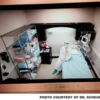Inpatient Strokes Average 4.5 Hours From Recognition to Computed Tomography
Time, in hours, from recognition of stroke symptoms to computed tomography for hospitalized patients, compared with 1.3 hours for stroke patients brought to the ED, according to a study recently presented at the Canadian Stroke Congress.
The report estimates 17% of strokes occur among inpatients, but those patients wait longer for both neuroimaging and thrombolysis. Inpatients who experienced strokes also had longer hospital stays and higher mortality rates than patients brought to the ED. Researchers suggest that signs of stroke may be overlooked in patients who were admitted to the hospital for another reason, which is the main focus for their hospital caregivers, compared with stroke symptoms that occur in the community, where they may stand out more starkly.

